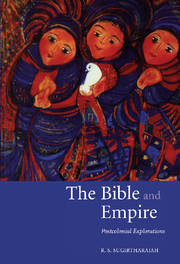Book contents
- Frontmatter
- Contents
- Acknowledgements
- Introduction
- 1 Textually conjoined twins: Rammohun Roy and Thomas Jefferson and their Bibles
- 2 Salvos from the Victorian pulpit: conscription of texts by Victorian preachers during the Indian rebellion of 1857
- 3 Thorns in the crown: the subversive and complicit hermeneutics of John Colenso of Natal and James Long of Bengal
- 4 Texts and Testament: the Hebrew scriptures in colonial context
- 5 Imperial fictions and biblical narratives: entertainment and exegesis in colonial novels
- Afterword
- Select bibliography
- Index of biblical references
- Index of names and subjects
1 - Textually conjoined twins: Rammohun Roy and Thomas Jefferson and their Bibles
Published online by Cambridge University Press: 02 December 2009
- Frontmatter
- Contents
- Acknowledgements
- Introduction
- 1 Textually conjoined twins: Rammohun Roy and Thomas Jefferson and their Bibles
- 2 Salvos from the Victorian pulpit: conscription of texts by Victorian preachers during the Indian rebellion of 1857
- 3 Thorns in the crown: the subversive and complicit hermeneutics of John Colenso of Natal and James Long of Bengal
- 4 Texts and Testament: the Hebrew scriptures in colonial context
- 5 Imperial fictions and biblical narratives: entertainment and exegesis in colonial novels
- Afterword
- Select bibliography
- Index of biblical references
- Index of names and subjects
Summary
[T]he chief thing is not to interpret the Gospels, but to understand them as they are written.
Leo TolstoyBefore the Victorian search for the life of Jesus started in earnest in the late nineteenth century, there were two ‘lives’ of Jesus compiled from the four gospels; they preceded these scholarly endeavours and have gone unnoticed by historians of biblical studies. One was The Precepts of Jesus by an Indian, Raja Rammohun Roy (1774–1833), and the other was The Life and Morals of Jesus by the second President of the United States of America, Thomas Jefferson (1734–1826). Significantly, both publications came out in the same year, 1820. Motivated by practical needs, and scarcely interested in defending the authenticity of the scriptures, the Indian and the American attempted to retell the story of Jesus in a way that would reconfigure him as simply an expounder of moral precepts – a retelling that would trouble the received notions of Jesus and prove to be unpalatable to the religious establishment of the time.
Rammohun Roy and Thomas Jefferson were men of exceptional calibre. One was part of a new ‘native’ elite emerging as a result of colonialism, and the other was a member of the founding generation of a newly independent colony. Significantly, both paid attention to religion. They were in varying degrees tantalized, inflamed, tormented and stimulated by it.
- Type
- Chapter
- Information
- The Bible and EmpirePostcolonial Explorations, pp. 9 - 59Publisher: Cambridge University PressPrint publication year: 2005



